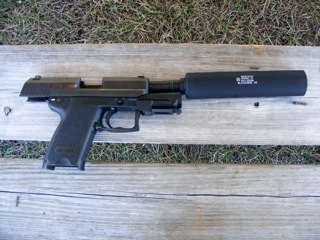 Possession of most Title II weapons are regulated by South Carolina law under Title 16. However, silencers are not mentioned in the statue, but that does not make it legal to possess a silencer in South Carolina. In order to possess Title II weapons you must comply with state and federal law. While South Carolina law does not make the possession of silencers illegal, federal law does. Therefore, to obtain a silencer in South Carolina you must apply to the Bureau of Alcohol, Tobacco, and Firearms (ATF) via a Form 4 application receive approval, and pay the $200 federal tax stamp. The ATF has certain requirements for individual applicants and other requirements for trusts and corporations that apply to purchase Title II weapons. A nice thing about using a NFA trust is that no CLEO signature or fingerprints are required. For more information about Title II weapons visit www.guntrustlawyer.com or contact a South Carolina Firearm Attorney.
Possession of most Title II weapons are regulated by South Carolina law under Title 16. However, silencers are not mentioned in the statue, but that does not make it legal to possess a silencer in South Carolina. In order to possess Title II weapons you must comply with state and federal law. While South Carolina law does not make the possession of silencers illegal, federal law does. Therefore, to obtain a silencer in South Carolina you must apply to the Bureau of Alcohol, Tobacco, and Firearms (ATF) via a Form 4 application receive approval, and pay the $200 federal tax stamp. The ATF has certain requirements for individual applicants and other requirements for trusts and corporations that apply to purchase Title II weapons. A nice thing about using a NFA trust is that no CLEO signature or fingerprints are required. For more information about Title II weapons visit www.guntrustlawyer.com or contact a South Carolina Firearm Attorney.
Articles Tagged with South Carolina
South Carolina Gun Laws for NFA Firearms
 Section 16-23-220 of the South Carolina Code of Laws prohibits the possession of machine guns, sawed off shotguns, and sawed off rifles. These firearms are commonly known as NFA firearms, Title II firearms, or Class 3 weapons. However, you can legally possess an NFA firearm in South Carolina if it complies with federal law and NFA regulations. Therefore, if a South Carolina gun owner obtains his Class 3 stamp from the Bureau of Alcohol, Tobacco, and Firearms (ATF), he may possess that Title II firearm in South Carolina.
Section 16-23-220 of the South Carolina Code of Laws prohibits the possession of machine guns, sawed off shotguns, and sawed off rifles. These firearms are commonly known as NFA firearms, Title II firearms, or Class 3 weapons. However, you can legally possess an NFA firearm in South Carolina if it complies with federal law and NFA regulations. Therefore, if a South Carolina gun owner obtains his Class 3 stamp from the Bureau of Alcohol, Tobacco, and Firearms (ATF), he may possess that Title II firearm in South Carolina.
Expunging a Criminal Record: South Carolina Versus Florida Law
In Jacksonville Florida, a person convicted crime cannot seal or expunge his criminal record. However, if a Florida criminal defendant is given a withhold of adjudication on the crime, he may be able to seal his Florida record. According to Florida’s expungement law, that criminal defendant must have his Florida criminal record sealed for 10 years in order to expunge his Florida criminal record.
- Fraudulent Checks (unless the crime is a felony).
Expunging Fraudulent Check Charges in South Carolina
According to South Carolina Statute Section 34-11-90(e), a person that has fraudulent check convictions in may expunge his record. South Carolina has certain requirements that must be met.
- The South Carolina fraudulent check conviction is a first offense.
- It has been one year since the South Carolina fraudulent check conviction, and the defendant has no other convictions during that one year period.
 Jacksonville Criminal Defense Lawyer Blog
Jacksonville Criminal Defense Lawyer Blog

